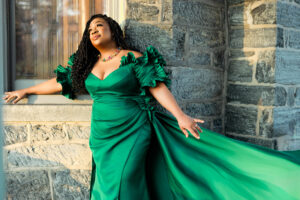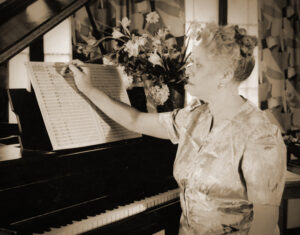Alumni Interview: Karen Slack and Michelle Cann On Their Grammy-Nominated Album, Beyond The Years

This past summer, internationally acclaimed soprano Karen Slack (Opera ’02) and Eleanor Sokoloff Chair in Piano Studies, Michelle Cann (Piano ’13 and ArtistYear ’15), released a groundbreaking new album, Beyond the Years: Unpublished Songs of Florence Price, through Azica Records. Produced by Azica’s Alan Bise and ONEcomposer, an organization that celebrates musicians whose legacies have been historically excluded, this 2025 Grammy-nominated album features 19 unpublished songs by Price, including 16 world premiere recordings. Listen to the album.
 How did this project initially originate and what was the process of bringing this songs to life?
How did this project initially originate and what was the process of bringing this songs to life?
Karen Slack: During the pandemic, my friends and collaborators Tamara Acosta and Steven Spinelli (ONEComposer) brought Michelle and me together to record Margaret Bonds and Florence Price’s works for digital content. The chemistry between us and the success of the session was so apparent that we discussed recording various unpublished works by these incredible women. ONE Composer presented manuscripts of many Price songs, some of which were incomplete. I originally wanted to record all of Paul Lawrence Dunbar’s texts because his work is so prolific, but not all of those songs were complete, so I chose the poets that resonated with me the most.
The album was clearly a labor of love. Was there a different approach to learning these songs with no modern performance history?
 Michelle Cann: I’ve been really fortunate because I’ve been on this Price journey for so long now. My debut album was Revival (released through Curtis’ record label, Curtis Studio), which [featured] some of her major piano solo works, and I’ve also recorded the piano quintet. I’ve already done some scholarly work with her music; therefore, I’ve had a chance to really study her voice. I have a perfect sense of her compositional style. And because of that, even though for many of these songs, there were no references at all, no recordings—many of them were unpublished, and we’re working on that. They still seemed familiar to me in a lot of ways.
Michelle Cann: I’ve been really fortunate because I’ve been on this Price journey for so long now. My debut album was Revival (released through Curtis’ record label, Curtis Studio), which [featured] some of her major piano solo works, and I’ve also recorded the piano quintet. I’ve already done some scholarly work with her music; therefore, I’ve had a chance to really study her voice. I have a perfect sense of her compositional style. And because of that, even though for many of these songs, there were no references at all, no recordings—many of them were unpublished, and we’re working on that. They still seemed familiar to me in a lot of ways.
 But then, as much as I was familiar with her writing, I also loved how I saw different sides of her through some of these songs. It’s just fascinating that there are still aspects to her writing, as much as I’ve been able to hear and study it, that I still haven’t quite seen. She was using some techniques and a sound world that I wasn’t accustomed as much to hearing from her. It just confirmed what I knew about her, that she was such a varied writer with so many influences. She, as any great composer would, evolved in her writing style and grew over time, and tried different things.
But then, as much as I was familiar with her writing, I also loved how I saw different sides of her through some of these songs. It’s just fascinating that there are still aspects to her writing, as much as I’ve been able to hear and study it, that I still haven’t quite seen. She was using some techniques and a sound world that I wasn’t accustomed as much to hearing from her. It just confirmed what I knew about her, that she was such a varied writer with so many influences. She, as any great composer would, evolved in her writing style and grew over time, and tried different things.
KS: Labor of love is an understatement! It is an absolute honor to be one of the first singers to record many of these pieces. Because of time constraints with the team, I had to learn 22 songs in under five weeks, but these are such glorious pieces it wasn’t difficult to do. The tough part was to work them all into my voice. Price wrote beautifully for voice and piano, giving us lush, timeless melodies, but what might sound simple and fairly easy on the recording, most of these pieces require advanced technical singing and piano skills. I chose the title Beyond The Years because, personally, I believe they transcend time. They all have aged like fine wine!
What condition were the songs originally in (since much of Florence Price’s work is only now getting published for the first time)?
KS: The manuscripts of the pieces I chose were beautiful, clear, and specific. ONEComposer [has] over 140 songs on file, I believe.
 Karen, how was this process different from tackling the newly composed songs of your acclaimed African Queens project?
Karen, how was this process different from tackling the newly composed songs of your acclaimed African Queens project?
KS: Some would argue that many of today’s composers shy away from composing songs that are easy on the vocal instrument and pleasing to the ear of the audience for no real solid reason other than how they hear things in their head. African Queens is a much larger project, and it is also a labor of love and advocacy! Where African Queens is advocacy for unknown stories of women who did extraordinary things throughout history that deserve to be widely told, Beyond The Years is advocacy for Florence Price who was kept out of her rightful place among the great composers because she was a Black woman.
In preserving her legacy and lifting Price’s unjustly muted voice during her lifetime, what do you hope will be the lasting impact of this album of advocacy?
 MC: The lasting impact of this album is the way I feel about everything I’ve approached when it comes to recording her music and promoting her music. I want to make sure these songs are widely heard, and become part of the standard repertoire—even from the youngest level, from high schools and junior pianists. Right now, I’m speaking pianists, but really anything. There are often guidelines for pieces that should be learned at this intermediate level or this advanced level, and they’ll list these Beethoven sonatas and Schumann pieces. How often, if ever, do you see a Black composer in that list of recommendations?
MC: The lasting impact of this album is the way I feel about everything I’ve approached when it comes to recording her music and promoting her music. I want to make sure these songs are widely heard, and become part of the standard repertoire—even from the youngest level, from high schools and junior pianists. Right now, I’m speaking pianists, but really anything. There are often guidelines for pieces that should be learned at this intermediate level or this advanced level, and they’ll list these Beethoven sonatas and Schumann pieces. How often, if ever, do you see a Black composer in that list of recommendations?
The work that we are doing—that many of us out here are doing—is to put the best that we can forward of Price’s music, the best quality recordings and performances of her music so that people will appreciate its greatness in its own right. Her work was written in the periods of many of these other great American composers and deserves to be treated as such. It is so important to change the narrative—the whole idea that this music is other, that this is for Black History Month or a special project. It lives right next to Schumann or Tchaikovsky. Now you’re starting to see [Price’s work] being programmed by many orchestras, by many different pianists of all genders, of all races. That, to me, is success. It’s when we are now just seeing this music as great music that everybody should enjoy, everybody should play, consume, and learn about—this is how she becomes part of history in the way she deserves to be.
KS: My biggest wish is that these pieces are published by 2025 and made available to every musician interested in the works of Price and that they become a part of the American art song canon. Most know Ms. Price’s gorgeous spiritual arrangements and settings of Langston Hughes’ text but her tremendous art song repertoire is mostly unknown. I hope Beyond the Years makes artists more curious about her work and that we hear these and many more pieces on recital programs all over the world.
Listen to the first single off the album, “Desire.”
Visit Karen Slack’s official website. Visit Michelle Cann’s official website.
Learn more about Beyond the Years and about Ms. Slack’s special commissioning project, African Queens, featuring works by composers Jasmine Barnes, Damien Geter, Jessie Montgomery, Shawn Okpebholo, Dave Ragland, Carlos Simon, and Joel Thompson.
Watch a live performance of Florence Price’s published song, “Bewilderment” (not featured on Beyond the Years), filmed at Curtis’ Gould Rehearsal Hall; produced by Curtis and ONEComposer.
Photos of Karen Slack by Kia Caldwell. Photos of Michelle Cann by Titilayo Ayangade. Photo of composer Florence B. Price. Special Collections, University of Arkansas Libraries, Fayetteville.
Interview with Karen Slack and Michelle Cann by Ryan Scott Lathan.


